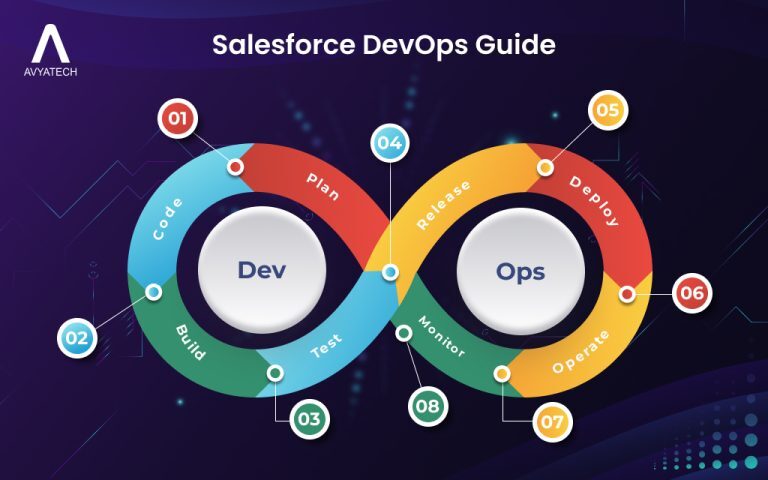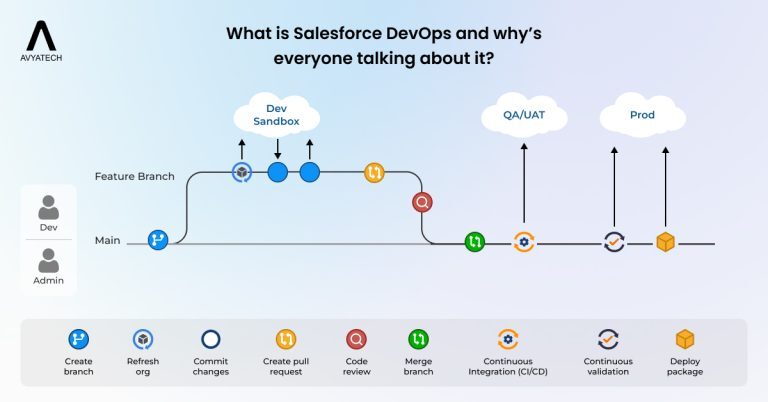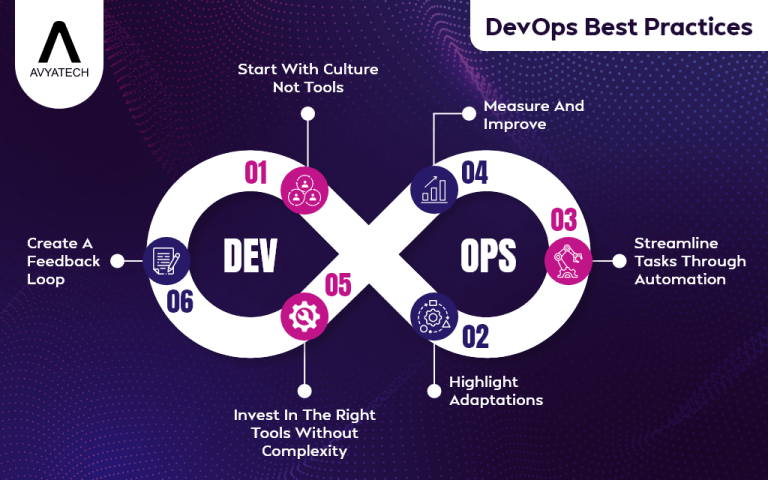DevOps brings both development and operations teams closer to each other to achieve high-quality delivery. It has multiple benefits for all directly or indirectly associated with the SDLC. DevOps best practices comprise automation, monitoring, agile project management, continuous feedback, shifting left with CI/CD, and observability. Salesforce DevOps promotes better teamwork, trust, faster releases, smarter work, quicker problem-solving, and better handling of unexpected work. In a DevOps culture, teams share responsibility and communicate openly. They think about how their work affects others. This leads to faster and better-quality work.
DevOps teams release updates more often and with fewer problems. They use tools that automate tasks, which saves time and reduces mistakes. When unexpected issues come up, DevOps teams adopt top practices to fix them faster. Open communication helps teams work together to solve problems quickly. DevOps helps teams manage surprise tasks without falling behind on planned work. They can see what needs to be done and adjust their plans more easily. Look at top Salesforce DevOps practices, specific tips, and recommendations that enable you to achieve success with Salesforce DevOps.
Top Practices for The Success of Salesforce DevOps
Assess the need for DevOps
Before implementing DevOps, make sure it is driven by business needs, not just because it is popular. Align your IT goals with your overall business objectives. DevOps should be adopted only if it improves your development process and supports your business goals.
Take the time to fully understand your application and its requirements. Once you are clear, align those goals with your DevOps strategy to create a suitable infrastructure.
Prioritize communication and collaboration
When you integrate with business, development, and other various teams like sales and marketing, you have much more organization. DevOps philosophies allow cross-functional teams to eliminate silos and concentrate on common objectives.
Open and smooth communication results in better transparency and productivity between operations, developers, and stakeholders. DevOps is simply about promoting communication and delivering the right feedback. Here, tools like Slack or Microsoft Teams can make a big difference.
Hire the Right People
People are the backbone of DevOps. The right team with the right skills is essential to DevOps. Not only that, but you must hire new blood or train your current staff to think automation first and to always seek ways to shrink the development/deployment cycle.
Your DevOps team should be able to lead the way with the best practices and make the process as streamlined as possible from day one. These are the folks who will help your team embrace the new way of working and be agents of change. These people will help your team adopt new ways of working and drive the transformation.
Focus on CI and CD
DevOps has multiple features, but its unique feature is uninterrupted delivery. It gives developers an advantage when they work in a team. Continuous Integration (CI) incessantly combines code changes into a shared source. Consequently, it allows teams to come together seamlessly.
On the other hand, Continuous Deployment (CD) lets the team deploy every change to production whenever required. This entails testing in a staging environment and then deploying to production. It also automates a lot of tasks to minimize the chance of mistakes.
Measure DevOps Success
To discuss the use of DevOps, one must be able to see the benefit of it. The reason that so many companies fail is because they don’t track the value that DevOps produces.
Set clear goals for DevOps and measure progress using metrics like release speed, code quality, or application performance. Metrics will help your team spot and resolve any roadblocks quickly, ensuring continued success.
How to Achieve Success with Salesforce DevOps Initiatives?
Salesforce DevOps has been a game changer for software and application developers for years. It comes to the rescue of all who always look to achieve faster release cycles with high quality. DevOps has become increasingly important, but using it effectively can be challenging. Look at seven tips to improve DevOps efficiency:
Track the right metrics
Use visual reports to measure DevOps processes and collaboration. These metrics help teams make decisions and improve quality. DevOps provides insights on deployment time, component tracking, and code quality.
Increase visibility
Keep leaders and developers informed about technical challenges and team processes. Share deployment metrics and planning information to align delivery goals.
Monitor release performance
Assess the impact of changes by measuring release performance. DevOps tools can help manage and troubleshoot deployments across teams and environments.
Make testing a routine
Integrate testing into the deployment process to catch issues early. Use quality gates and automated test suites to improve efficiency and reduce regression problems.
Encourage collaboration
Ensure all team members are aware of changes by continuously merging updates to a central repository. Use automated notifications to keep everyone informed throughout the deployment process.
Automate deployments
Develop an automated deployment process using version control as the source of truth. This helps manage metadata across different teams and maintains coordination.
Secure integrations
Prioritize security when integrating development and production environments. Look for platforms with pre-built integrations to avoid security concerns associated with custom solutions.
DevOps tools can help you implement successful Salesforce DevOps initiatives with features like profile migration, component tracking, quality gate reports, and secure integrations. It also provides CI/CD pipelines that integrate security and quality checks, add approval gates, and offer relevant KPIs.
By following these tips and using appropriate tools, teams can improve their Salesforce DevOps efficiency, leading to faster deliveries, better collaboration, and higher-quality software.
Conclusion
Adhering to all the above-mentioned Salesforce DevOps practices, tips, and recommendations helps you implement successful DevOps initiatives and achieve success with Salesforce DevOps. Overall, DevOps helps teams work more efficiently and deliver better results to customers. It uses automation to reduce errors and helps teams recover faster when problems occur.
Salesforce developers, consultants, and administrators looking for practical advice for the implementation of successful Salesforce DevOps initiatives can take help from AvyaTech Salesforce DevOps experts.




















































































